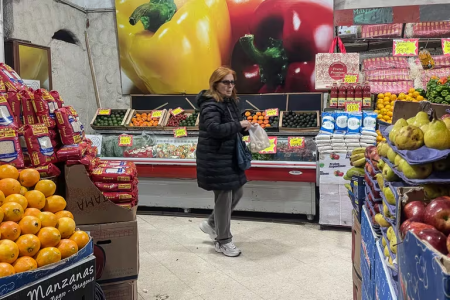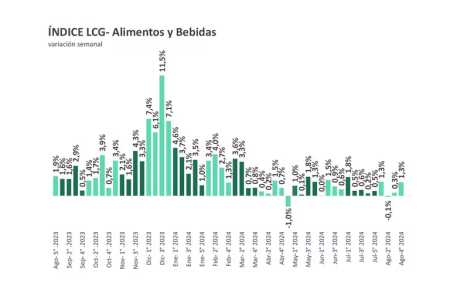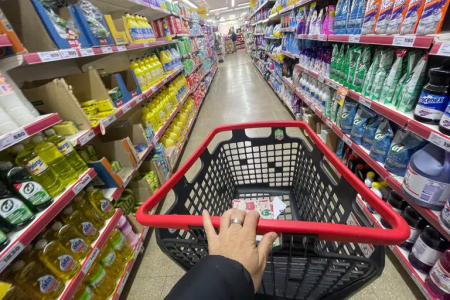All the Answers
Well-known member
The rise in food prices accelerated in the last week of August, but analysts estimate inflation below 4% - Infobae

Source:

El alza de los alimentos aceleró en la última semana de agosto, pero los analistas estiman una inflación menor al 4%
Algunos especialistas sugieren que la tendencia al alza podría estabilizarse hacia fin de mes, mientras otros advierten sobre posibles ajustes que podrían modificar las expectativas inflacionarias
August 29, 2024
Some specialists suggest that the upward trend could stabilize towards the end of the month, while others warn of possible adjustments that could modify inflationary expectations.

Food inflation rose 2.8% from start to finish in the last four weeks. EFE
While food prices rose in the last week of August, inflation projections for the end of the month remain divided. Some consulting firms say the final figure could be below 4%, amid a scenario where increases in key products, such as meat, continue to set the pace of the general rise.
According to the LCG consultancy , food inflation accelerated by one percentage point in the last week of August, going from 0.3% to 1.3%. Meanwhile, the average increase accelerated to 2.9% in the end-to-end measurement of the last four weeks.
The product with the greatest impact in the period analysed was meat , which increased by 2.3% compared to the previous week. This food alone accounts for more than half of the total food inflation in the fourth week of August.

(Fountain)
The price of condiments also rose 4% weekly, dairy products and eggs (2.3%), fruit (2.3%), ready-to-go meals (1%), drinks and infusions for home consumption (0.8%) and sugar, honey, sweets and cocoa (0.6%). The price of oils fell 1.5%, while vegetables and bakery products, cereals and pasta remained unchanged between the third and fourth weeks of August.
EcoGo , for its part, explained that in the fourth week of the month , food prices registered an increase of 0.8%, marking a slight acceleration compared to the previous week. “With this data and considering a projected increase for the last week of 0.6%, inflation in food consumed within the home would rise to 3.7% in August . Incorporating the increases recorded in food consumed outside the home (4.5% projected for the month), the indicator rises to 3.8%,” they said.
"Inflation in August would thus be 4% monthly , although the data is still preliminary and subject to changes," they noted.
Economist Alberto Cavallo also shared his analysis, stating on his X account that Argentina's monthly inflation rose from 2.8% to 3.2% in the first twenty days of August, according to estimates by PriceStats . “The trend remains stable around 3%. There is no evidence of a slowdown in the last week,” he said.

The reduction of the PAIS tax is expected to have an impact on inflation in the coming months. (EFE)
The FMyA consultancy firm , meanwhile, said that inflation for the month was a bit more complicated than expected. “The month began with a strong rise in food, which could have been seasonal, but in the third week the trend of increases above 1% per week did not ease, and it averaged 3.4% per month. Core inflation between May and July was stable at 3.7%/3.8%, and it does not seem that it will drop much in August. With a core of 3.5% and Regulated at 5%, we raised the inflation projection for August to 3.8%, and we do not rule out that it will reach 4% ,” they estimated.
In a recently released survey, Equilibra stated that inflation in the third week of August was 0.3% and the average for the last four weeks fell to 3 percent. The monthly estimate of general inflation for this consultancy is 3.5 percent .
With these data, the inflation outlook for August in Argentina appears uncertain. While some analysts maintain expectations of a final figure below 4%, others consider that price volatility could alter the initial projections. The next few weeks will be key to assess whether the acceleration observed in certain products persists. The impact of the reduction of the PAIS tax on thousands of products will also be key.
The Government hopes that the reduction of the PAIS tax that will take place from next Monday will impact the shelves and for that it seeks to have the supermarkets as allies, to whom it has asked to demand from their suppliers in the mass consumption industrial chain, lower prices due to the reduction in the cost of their production.

